Robin Helweg-Larsen's Blog, page 29
July 1, 2024
Susan McLean, ‘The Only Feminist in High School’

Two roads diverged in high school when a student
chose to study women’s liberation
to write her senior paper. Though imprudent,
that choice provided her an education
in bias, inequality, derision,
The Second Sex, The Feminine Mystique,
historical erasure, long division,
and talent gagged and shackled by physique.
She swore off make-up, wanted a career
but maybe not a family. She read
Kate Millett, Gloria Steinem, Germaine Greer,
and gave a speech on beauty, which, she said,
turned women into objects and betrayed
their goals. She didn’t want to be a mom
or movie star. When she went out, she paid.
Though never asked, she boycotted the prom.
The boys were baffled and the girls disdainful,
for who would want to talk to, much less date her?
And what she lost was obvious and painful,
while what she gained was only clear years later.
*****
Susan McLean writes: “This poem starts with the opening phrase from Robert Frost’s ‘The Road Not Taken‘ and it records a turning point in my own life of the sort that his poem describes. Though I hope that feminists are not such a rarity among high school students anymore, the term “feminist” is still so loaded that I tend to think of it as “the new F-word.” At one level, it still mystifies me that looking for equal opportunity and equitable treatment remains so controversial, but at another level, every society has been built on unequal opportunity and inequitable treatment since recorded history began, so it is not surprising that each step away from that system has made some people feel that the world was ending.
“I learned long ago that what a poem doesn’t say is as important as what it does say, so the ending of this one does not specify what was lost or what was gained. I want the readers to think about those things, so I don’t want to tell them what to think. As for why I wrote this in the third person, these events happened so long ago that it almost feels as though they happened to someone else. I am and am not that girl.
“The poem first appeared in my second poetry book, The Whetstone Misses the Knife.”
Susan McLean has two books of poetry, The Best Disguise and The Whetstone Misses the Knife, and one book of translations of Martial, Selected Epigrams. Her poems have appeared in Light, Lighten Up Online, Measure, Able Muse, and elsewhere. She lives in Iowa City, Iowa.
https://www.pw.org/content/susan_mclean
Photo: “Two Road Diverged…” by wackybadger is licensed under CC BY-SA 2.0.
June 29, 2024
Weekend read: Michael Murry, ‘Inconspicuous Conclusions’

A play’s last scene has often served as trope,
where theater, as metaphoric scheme,
enables authors to compose a dream
of Life as it exhausts its mortal scope.
The actors in our own Life’s play, we “hope”
and “love;” some “challenge fate;” some “sob” and “scream,”
but all personify Forever’s theme:
that with its ending, Life must simply cope.
I cannot speak for others in the cast,
but my bit-part as extra in The Show —
as son and father, husband to the last —
gave me such joy as any man could know.
I’ve lived a lucky life. Of this I’m certain.
So when my last scene ends, ring down the curtain.
*****
Michael Murry writes: “The background concerns the passing away of my 48-year-old son, Stuart Langston Murry, in a freak accident while visiting his mother in northern Taiwan. As part of the grieving process, I turned to reading some of my favorite poets – especially Edna St. Vincent Millay’s ‘Dirge Without Music’ – before composing an elegy for my son’s funeral: ‘A Song for Stuart’ published as a Memoir in Bewildering Stories Issue 1032, followed by a companion sonnet ‘Anticipating Anonymity’ published in Bewildering Stories Issue 1042. So much for the composition’s background. ‘Inconspicuous Conclusions’ was published in Bewildering Stories Issue 1043.
As for the formal sonnet structure of the composition, I chose to use as a model John Donne’s Holy Sonnet (VI) with its opening “This is my play’s last scene” for metaphorical theme. The sonnet’s 14 lines consist of iambic pentameter (5 stress accents and 10 syllables) lines: 12 with masculine endings and 2 lines for the closing couplet’s feminine endings (5 stress accents and 11 syllables): ABBAABBACDCDee.
For relevant biographical information, see my website: http://themisfortuneteller.com/ with my verse compositions under the “Poetic License” menu tab. Consider me a 76-year-old Vietnam Veteran Against The War – the one that never seems to end – retired and living in Taiwan for the last two decades. I started writing formal verse compositions in 2004 as a sort of DIY bibliotherapy for Delayed Vietnam Reaction. I haven’t stopped yet and see no reason why I should. You and your audience may find my work too polemical for most refined poetic tastes, so if you choose not to quote any of my verses, I will certainly understand. As you please . . .”
Photo: Michael Murry at Advance Tactical Support Base ‘Solid Anchor’, Vietnam, early 1970s.
June 28, 2024
Using form: Double Dactyl: Alex Steelsmith, ‘Clairevoyance’
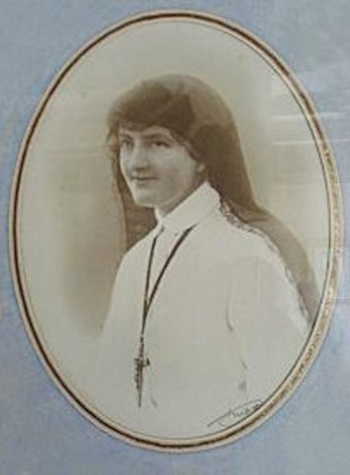 Claire Ferchaud (fer-SHO) was a young French shepherdess and mystic who became a modern-day Joan of Arc during World War I, campaigning to add the image of the Sacred Heart to the French flag. Though her proposal was ultimately rejected as a merely symbolic gesture, it was taken seriously and honored by the distinguished General Ferdinand Foch, who became Supreme Commander of Allied Forces.
Claire Ferchaud (fer-SHO) was a young French shepherdess and mystic who became a modern-day Joan of Arc during World War I, campaigning to add the image of the Sacred Heart to the French flag. Though her proposal was ultimately rejected as a merely symbolic gesture, it was taken seriously and honored by the distinguished General Ferdinand Foch, who became Supreme Commander of Allied Forces.Fearlessly, peerlessly,
Claire the clairvoyant one
pushed a proposal that
fizzled, although
Foch the preeminent
generalissimo
said, “Let’s all try it—and
not just Ferchaud.”
*****
Alex Steelsmith writes: “I tend to read widely and randomly, but ‘Clairevoyance’ didn’t come about in the usual way. Another double dactyl I had written, about the French mystic Marthe Robin, appeared in the previous issue of Snakeskin. In an email exchange I had with Snakeskin editor George Simmers about that poem, he happened to mention Claire Ferchaud, another fascinating Frenchwoman that Marthe brought to mind. I thought it would be a fun challenge to see if I could come up with one about Claire. That’s when I looked into her story and the pun leaped out for the last line of the poem. It felt a bit irreverent to be lightly punning on the name of someone who presumably was very serious and wouldn’t have been especially amused. In any case, I have George to thank for giving me the idea for the subject of the poem.”
Alex Steelsmith’s writing has appeared in USA Today, The Washington Post, The Spectator, Light, Snakeskin, Lighten Up Online, and other venues. He has been a Light featured poet, and a Pushcart Prize and Best of the Net nominee. More of his writing – and his artwork – is at http://www.alexsteelsmith.com/
Photo from Snakeskin
June 26, 2024
RHL, ‘On Disrespecting Ancestors’

I disrespect my ancestors fighting in wars,
Europeans fighting Europeans, blame without cause;
my English grandfather killed fighting the Germans,
my Danish uncle executed for killing with Germans,
my earlier German ancestors fighting the French,
my French ancestors fighting (and marrying) the English…
and the cause of the wars always indefensibly wrong.
Why should anyone glorify them in song?
Pride, greed and stupidity – these are the drivers of war.
I turn my back on all of them, stand on the sea shore,
marvel at wind and wave, at sun, moon and stars,
despising, ignoring, forgetting their idiot wars.
*****
I’m so sick of Putin, Netanyahu… and Bush Jr, Dick Cheney, Tony Blair… war criminals, the lot of them. But they’re the products of our genetic makeup as social animals, dividing everything into “us” and “them”, and then through crafty hysteria and massively organised mob violence, grabbing everything they can for themselves.
Anyway, this semi-incoherent rant of a poem was published in the current Amsterdam Quarterly, and editor Bryan R. Monte wanted one change in my submission: to change the last line’s “ape-idiot wars” to “their idiot wars”. As usual, I acquiesced. Also as usual, I’m not sure whether it is a good suggestion or not. Apes figure in a lot of my verse, as being an underlying reality of humans, essential to acknowledge, equally essential to try to control. In the context of my other work, I think I prefer “ape-idiot”.
Photo: “War of the Planet of the Apes Poster 2671” by Brechtbug is licensed under CC BY-NC-ND 2.0.
June 24, 2024
Using form: Iambic hexameter: Daniel Moreschi, ‘A Wing-stroked Spectacle’

Segmented sets of starlings sharply elevate
towards candescent skies, suspend, then circulate
in sync. Their wingspans whisper sunset symphonies
while manifesting silhouetted symmetries.
With poise, finesse and swiftness, they transform the air
into an ever-changing scape; this canvas where
each turn and swirl unfolds a painterly display:
a moving mural, rendered on a dying day.
The starlings coalesce to make a checkered veil.
They crown the clouds and skim across a coastal trail,
then separate as if surrendering to gusts,
and cover summits like a desert’s storm-flung dust.
With tapered pace, their fevered flights revert to long
glissades of shimmering shades; a showy dance along
a latent stopgap stage. They stir, careen, decline,
retracing what remains of lofty lazuline,
before it all becomes a screen of red-specked gold.
The starlings falter in its wake; they cannot hold
their elegance in fading light. Their spirals wane
in streaming chains. They spill in spates of jet-black rain.
*****
This poem was originally published by the Society of Classical Poets at the start of the year, after being awarded 4th place in their annual competition.
Daniel Moreschi writes: “Through its descriptions of the flights of starlings, this poem is intended to evoke reflections on how moments of beauty can be transient; the starlings’ flight patterns are fleeting and subject to change, much like all beautiful moments in life. I felt that verse written in alexandrines, brimming with fluidity, was an appropriate means to depict such an aerial display.”
Daniel Moreschi is a poet from Neath, South Wales, UK, who experienced a significant turning point when his ongoing battle with severe M.E. upended his life. However, during this period, he also rediscovered his passion for poetry, which had lain dormant since his teenage years. Writing has become a distraction from his struggles. Daniel has been acclaimed by over 70 poetry competitions and published in numerous NFSPS anthologies of prize-winning poetry, as well as by Lunar Codex, The Lyric, Society of Classical Poets, The Dawntreader, Westward Quarterly, Wishbone Words, The Chained Muse, Every Writer Resource, and an array of other journals and publications.
Instagram: @daniel.moreschi
Photo: “STARLING MURMURATION” by Tony Armstrong-Sly is licensed under CC BY-ND 2.0.
June 22, 2024
Weekend read: SF poem: RHL, ‘The Uncertainty of Light’

On an asteroid
there was an alien artefact.
If such it was… a droid…
I’ve no idea, in fact.
Its metal (leg?) seemed (deployed?)
and so I touched it, but responses lacked.
Once there were women; once I was a man
(touching a leg then always brought response)
before the search for life and light began
to change me into this dark renaissance.
The teacup storms on which I’ve tossed,
when she or I have bitched and bossed
till all the loves I’d ever marked
were all the women that I’ve lost.
They chose the certainty of Dark
over the uncertainty of Light.
The joys of life are what’s uncertain:
hopes of what’s behind the curtain,
knowing the results will grate
of things that you anticipate,
knowing your life could be wrecked
by what you never could expect.
And though you think you’re circumspect,
you can’t deflect, inspect, collect.
Knowing the harvest is unknown
with crops that grew from deeds you’d sown,
while all your greatest hopes and dreams
will be exceeded by the future’s smallest gleams.
Because change never stops, you find what matters
is never really known.
You may get verbal assurance of your future status,
but was it “throne” or “thrown”?
The only certainty would be
if, offered immortality,
you feared what such an altered world would lose, would save,
and chose instead to go into the Dark
with furnace no less dark than the grave
wherein there lies no risk of further blight.
Most people choose the Certainty of Dark
over the Uncertainty of Light.
But we who strive to stay alive
long enough for rejuvenation
hope, hope only, we will thrive,
post-humans in a re-Creation,
unknowing what our ape-based genes
will do with power dominance,
with war, with sex, Earth mined and undermined,
but glad to take the chance.
How else can we see scenes
of how it all turns out — destroyed? refined? —
unless we scrape through, level up with wounds and scars
and watch a world we love and leave behind?
So at last I am here, between the stars,
transiting the darkness of the Void,
the empty galaxy’s apparent night,
chanting the mantra that keeps spirits buoyed:
Let there be Post-Humanity’s own light!
Between the spiral arms in the near-void
there’s still thin light of distant galaxy and star,
still specks of dust, rarely an asteroid.
Earth left (millennia in old Earth years ago),
I cross the dark immortally, beyond, afar,
through what is darkness only to Earth-eyes
which myriad wavelengths up and down can’t know,
but which I now apprize.
Light here abounds,
and boundlessly surrounds, astounds.
Take the smallness from slight,
take the bad from the blight,
take the fear out of flight
and you’re left with the light, the light, the light.
We stumble from dark caves of night
into day, trying not to tumble;
our parents the dark; post-humans the light;
ourselves just the stumble.
*****
This poem (published in this week’s Bewildering Stories) is a response to conversations in which people have expressed pessimism about the value of life extension, rejuvenation, cryonic preservation and resuscitation… anything beyond the certainties of a clear end to life after a normal lifespan. “How will you… why would you… what if they… you won’t understand… you won’t have…” Ah, but everyone who has immigrated into a foreign culture has done this: had to learn a new language in order to find a job and start making friends and find out how everything works. Some of us are comfortable doing this; some people aren’t. I’ll take the uncertainty, and enjoy its discomforts… because it’s just so interesting!
Photo: “Into the Light: The Future is Uncertain” by tenzin.peljor is licensed under CC BY-SA 2.0.
June 21, 2024
Using form: Songs as poems: Duncan Gillies MacLaurin, ‘But At Least I Had A Ball’
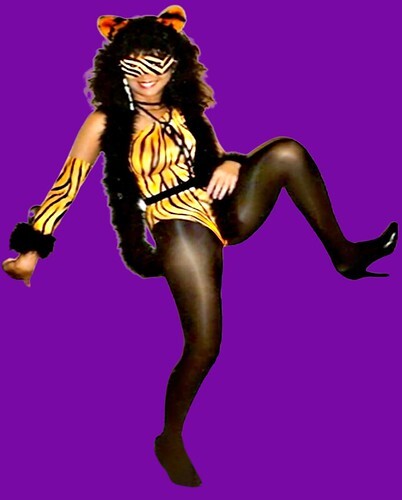
I’ve always loved to sing an’ dance.
I’m better at the first.
An’ given even half a chance,
I’m bound to do my worst.
I’ve struggled sometimes with romance,
succumbed to alcohol,
but at least I had a ball.
I liked to smoke a lot of weed
an’ hash while in my prime.
I’d barely write an’ hardly read,
just wasted space an’ time.
I didn’t think that I’d succeed
with anything at all,
but at least I had a ball.
I did some LSD an’ coke,
but didn’t dare touch smack.
The people on it weren’t a joke.
I’ve never sampled crack.
I still enjoy a drink an’ smoke.
Like everyone, I’ll fall,
but at least I had a ball.
I wasn’t any good at jazz.
I tried it on trombone.
I’ve stayed away from razzmatazz.
I’d rather be alone.
I’ll never be as famous as
that guy from Montreal,
but at least I had a ball.
I found myself in poetry,
then turned it into song.
I see it as my destiny.
It’s here that I belong.
I may end up in poverty
with nobody to call,
but at least I had a ball.
*****
Duncan Gillies MacLaurin writes: “I’ve been wanting to do songs like Cohen and Dylan for years – ones that have a repetend at the end, and I’ve finally achieved that.” This poem was published in the current edition of Snakeskin.
Duncan Gillies MacLaurin is a Scottish poet who was born in Glasgow in 1962. He studied Classics at Oxford, left without a degree, and spent two years busking in the streets of Europe. He met a Danish writer, Ann Bilde, in Italy in 1986 and went to live in Denmark, where he teaches English and Latin. His collection of 51 sonnets, I Sing the Sonnet (2017), is online at Snakeskin. He blogs here. His experiences as an ex-pat poet are described in the first issue of the e-zine, The Chimaera.
Photo: “We Had Some Wild Parties” by lyndawaybi3 is marked with CC0 1.0.
June 19, 2024
Sonnet: RHL, ‘The Days Have Come Unhooked’

The days have come unhooked from passing time,
its little Brio trucks are off their tracks;
the past and future mix to make their rhyme,
with pieces placed at random in fresh stacks.
Clear memories blend their present, future, past.
The days stretch out, and yet the months fly by –
you turn in circles, facing first, not last.
As childhood deepens, old age pools go dry.
Behind its smoke and mirrors, whores and pimps,
its harshly lovely playful attitude,
reality is thinning – you now glimpse
an indescribable infinitude.
The game is won – your enemies are no more,
yet you don’t end it while you max your score.
*****
Published in the Spring 2024 issue of The Road Not Taken.
Photo: “Brio freight train set” by Ben Sutherland is licensed under CC BY 2.0.
June 17, 2024
Light verse: Melissa Balmain, ‘Lament’
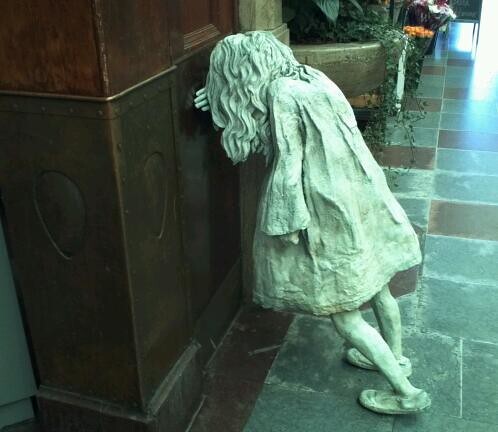
Mama never horsewhipped me
or shoved things up my fanny.
She wasn’t hooked on PCP
and didn’t bump off Granny.
Daddy never climbed in bed
to open my pyjamas.
He read me Charlotte’s Web instead;
the bed he shared was Mama’s.
In college, I did not turn tricks
or date warped literati.
I haven’t starved myself to sticks,
joined cults, or loved John Gotti.
The guy I married doesn’t drink,
or French-kiss other fellers.
It really makes me sad to think
I’ll never write best sellers.
*****
From Walking in on People © Melissa Balmain, 2014. Used by permission of Able Muse Press.
Melissa Balmain writes: “This is the first poem I ever published outside of a school journal–in Light, then known as Light Quarterly. Thanks in no small part to the encouragement of Founding Editor John Mella, I never looked back.”
Photo: “Sad child” by Lejon2008 is licensed under CC BY-NC-SA 2.0.
June 14, 2024
Political poem: George Simmers, ‘Navalny’
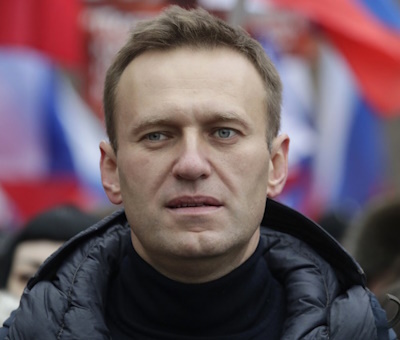 In memory of Alexei Navalny, killed at the IK-3 penal colony,
In memory of Alexei Navalny, killed at the IK-3 penal colony, 16 February, 2024.
1.
Rough and chivvying cold winds blow
The helpless dead leaves to and fro.
Leaves have no say in where they go
But we’re alive so can say no –
Let us praise those men who show
Resistance to the easy flow.
2.
Navalny, prisoner in the snow,
In numbing twenty-eight below,
Has paid the price for saying no;
He’s gone the way we feared he’d go.
That’s Putin, making sure all know
That retribution comes in tow
For those who won’t go with the flow.
‘All dissidents will finish so,’
The message is: ‘Go with the flow,
Or you too could end on Death Row.’
I imagine his warders: Did they know
A twinge of guilt at this, or show
Regret or shame? I doubt it. No –
Why should men let a conscience grow
When they can just go with the flow?
When life is so much easier so,
When every television show,
The papers and the radio
All radiate a conformist glow
Incessantly, so all men know
Life’s comfier with the status quo.
It’s only awkward sods say no,
Go their own way, not with the flow.
Those have a dangerous row to hoe,
And who can blame the average Joe
For on the whole deciding: ‘No,
That’s not for me. I’d rather toe
The line, collect my wages, know
I’m safe and needn’t undergo
What brave men have to suffer. No,
Go with the flow, go with the flow.’
3.
In Moscow brave girls risk a blow
By laying flowers in the snow
To honour him for saying ‘No’.
Brave girls. I admire them so.
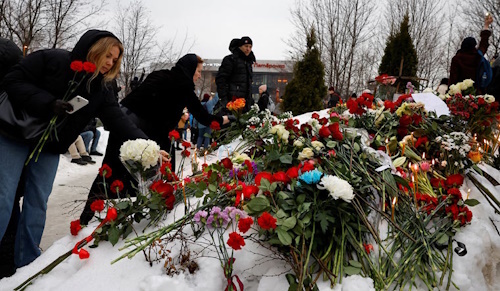
*****
George Simmers writes: “This poem began because our local Arts Festival announced its theme as ‘Flow’. Which made me grumble a bit: was I supposed to write stuff about how nice it was that rivers flowed? Not my style. But then I thought about people who go against the flow by saying ‘No!’ and that suggested a subject and a rhyme scheme. It was only after I’d scribbled a few possible lines that I came across a photo of young women in Moscow placing flowers in the snow as tributes to the murdered Russian dissident, Alexei Navalny. In some towns, such protestors had been arrested or beaten up by the police.
“It’s thirty-odd years since I visited Russia. That was at the time of perestroika and hopefulness. We had a contact in Moscow who took us to see the sights, including the Arbat, a popular meeting- place. He said: ‘Can we stop and talk here for a few minutes? I ask because a few years ago If I had been seen here in conversation with a foreigner, I should have been arrested.’ Freedom was precious then, but repression returned.
“Navalny was a lawyer who campaigned against the corruption endemic in Russian political life. In 2020 he was poisoned with Novichok (probably by the Federal Security Service) ; after hospital treatment in Berlin that saved his life, he returned to Russia, even though he knew of the dangers. He was immediately arrested, and ended up in an Arctic Circle corrective colony. The exact circumstances of his death still remain unclear, but while in prison he had suffered from malnourishment and mistreatment.
“Writing this poem I remember Auden’s words: ‘Poetry makes nothing happen.’ Auden pointed out that political poems make the writer feel better, but have no positive effect in the real world. He was right, as usual, which is why I mostly avoid writing poems about politics. But I don’t really see this as a poem about Navalny. I could have chosen to write about Alan Bates and his twenty-five year battle for justice for postmasters, or about Kathleen Stock and others, who opposed the dangerous ideology of the Tavistock clinic. Going against the flow matters everywhere, not just Russia. The form is monorhyme, mostly because that’s how the poem started, and it wasn’t too difficult to keep going. Monorhyme is easier than it looks, so long as you choose the right rhyme word to start with. Don’t try it with ‘month’ or ‘silver’.
“Nalvalny’s death made a news splash in February, but since then more recent horrors have displaced it on the news pages. So maybe this poem will do a little good as a reminder of a brave man. Thank you for re-blogging it.”
The poem will be part of the film ‘Wordflow’ (a film by John Coombes with a soundtrack of stories and poems by Holmfirth Writers’ Group in a continuous showing from 10am-4pm), presented at the Holmfirth Arts Festival in Yorkshire on Sunday, June 16th, upstairs at the ‘Nowhere’ bistro, Norridge Bottom, Holmfirth, HD9 7BB.
George Simmers used to be a teacher; now he spends much of his time researching literature written during and after the First World War. He has edited Snakeskin since 1995. It is probably the oldest-established poetry zine on the Internet. His work appears in several Potcake Chapbooks, and his recent diverse collection is ‘Old and Bookish’.



